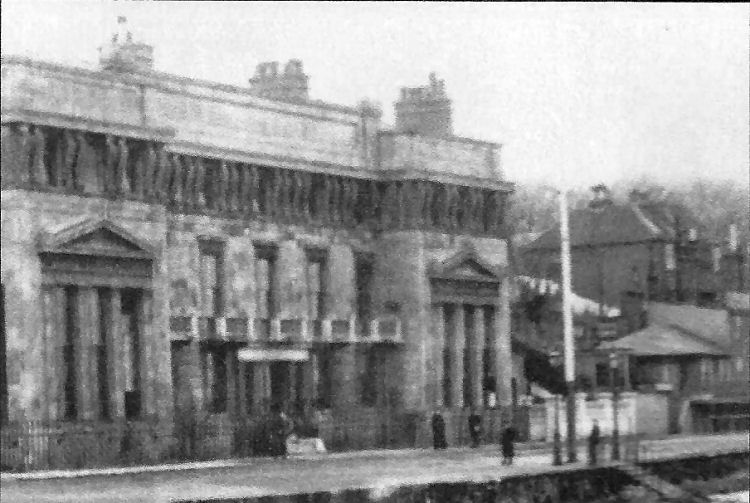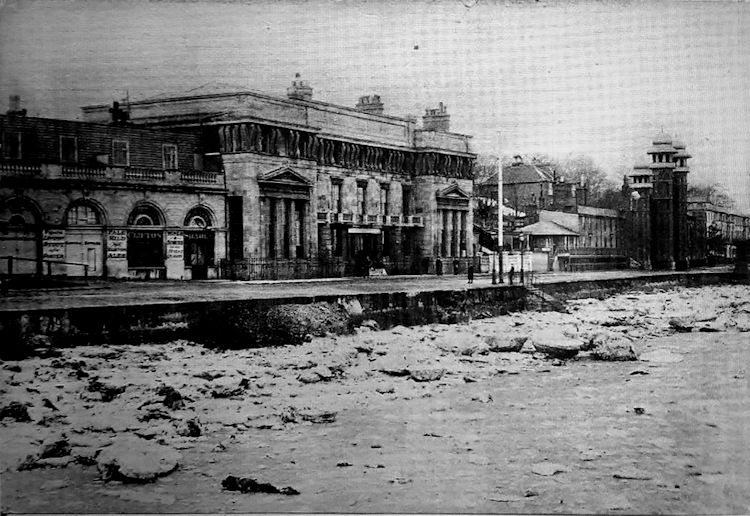|
From the West Kent Guardian, 5 May 1838.
FAREWELL MESS DINNER OF THE LATE COBHAM TROOP.
On Wednesday evening last the farewell mess dinner of the late Cobham
Troop of West Kent Yeomanry, was held at Mr. Pallister’s new and
splendid "Clifton Hotel," Gravesend, being the first festival held on
the premises. The dinner was laid in the magnificent room attached to
this hotel; the style of which we seriously recommend to the
corporation, the next time they set about erecting a Town Hall for the
inhabitants. The table was laid in the first manner, and in the evening
the beautiful new or-molu chandeliers were lighted with wax candles. The
room was decorated with the colours of the troop. About 80 gentlemen sat
down to the dinner provided with all the well-known taste and substance
of Mr. Pallister, the worthy proprietor of the hotel. Three professional
gentlemen, Messrs. Hudson, Furness, and Van Buren, who were engaged,
added greatly to the pleasure of the evening by their spirited singing.
John Batten, Esq., was in the chair. Thomas Munn Gladdish was deputy
chairman. On the right of the chairman sat Lieutenant Gladdish, and
Cornet Nicholson; and on the left, Adjutant Albert, and William Hubble,
Esq. There were also present, Adam Park, Esq., Fras. Southgate, Esq.,
John Smith, Esq., E. W. Woodfotd, Esq., William Brown, jun., Esq., Henry
Ditchburn, Esq., Thomas Collyer, Esq., Henry Rosher, Esq., William
Manclark, G. J. Russell, and John Tilden, Esqrs., &c, &c. At about six
o’clock the dinner was placed upon table, to which the justice it
certainly deserved was done. After the removal of the cloth, the usual
loyal and patriotic toasts were drank with enthusiasm. The national
anthem was sung in full chorus, and the songs, '‘Woman!" "The Flag
that’s Braved a Thousand Years," and "The Return of the Admiral" by
Messrs. Van Buren and Turness.
The Chairman then apologised for Major Kelly's absence by saying he was
too ill to attend, which was not known until that morning.
Toast— "The Members for the County drank with three times three, and one
cheer more.
The Chairman then observed that he hoped no political feeing of any
description would be suffered to mar the pleasure of the evening. He
hoped that anything even bordering on politics would not be known among
them. He said this in order to relieve the minds of any one who might be
anxious on that account, and to assure them, if he had thought the
contrary would have been the case, he should not have had the pleasure
of being there— (hear, hear).
Comic song— Mr Hudson.
The Chairman then proposed the health of the Earl of Brecknock—(cheers),
their late highly esteemed colonel. During the period he was connected
with the Yeomanry, how well they could all say, that he was an honour to,
as he was honoured by, the troop— (cheers). He (the Chairman) spoke of
him as an officer and a gentleman— (cheers). He (the chairman) had that
day received a letter from their noble friend, to which he called their
most earnest attention, begging again that they would divert themselves
of all political feeling upon the subject, and look at the letter as men
of principle, of honour, and understanding. He (the chairman) therefore
earnestly requested them to attend at the "Falstaff," Gad's Hill, at ten
o'clock on Monday morning next to receive this letter, and give it their
most serious attention. He (the chairman) would now leave the toast in
their hands— (drank with three times three, and one cheer more).
Song— Mr Higgins, amateur.
The Chairman, in an eloquent manner, proposed the health's of Captain
Bligh, Lieut. Gladdish, and Cornet Nicholson— (cheers). He (the
chairman) would be a hypocrite if he said he felt pleasure in proposing
this toast under the circumstances. He regretted deeply to be separated
from such men, for whom he had always had the highest feelings of
respect and regard. He had asked them to drink the health of three
individuals who, either collectively or individually were worthy to
associate with Englishmen of any rank and honour— (cheers). It had been a
pleasure to him, in the humble walk of life he had been placed in, to
receive their smiles— (cheers). He did not have one thing, and mean
another— he spoke as he felt— He did regret that as officers and men
they must part- (cheers). He could no longer say he was proud to act
under Captain Bligh. Lieut. Gladdish, and Cornet Nicholson. That time
had passed— (cheers) — he hoped not for ever- (immense cheering). If he
had had the advantage of a better education, or the benefit of more
elevated or extended society, he might perhaps on such a subject, have
spoken better— (cheers)
To Lieut. Gladdish they were under great obligation for the efficiency
of the troop, he did not say this in disparagement of Captain Bligh,
whose occupation precluded his paying more attention to the troop. He
(the chairman) could at least say the troop had maintained its station
in the regiment—(cheers). They had had disadvantages to combat against,
and they had overcome them, and it was a high gratification to see them
altogether, and at last, as then in good fellowship— (continued cheers).
Lieut. Gladdish rose to return thanks. He felt grateful for the
honour
the company had done him, and for the manner in which his name had been
received. It was a gratitude that he should not forget to the end of his
life— (cheers). He did not speak for his brother officer, who was well
able to speak for himself, but he could say for both that the meeting
had added honour to their names by associating them with Captain Bligh.
He (Lieutenant Gladdish) was satisfied that Captain Bligh must have had
weighty reasons for not then appearing amongst them. He (Lieut, Gladdish)
had spent the proudest and happiest days of his life with the Cobhan
troop— (cheers). They had been seven years together, during which time
nothing had disturbed their cordiality, no party feeling, no political
prejudices, were suffered to destroy the harmony that existed amongst
them— (cheers). He could, therefore, but regret with the worthy
chairman, that a dissolution had taken place, it must ever be a subject
of regret, but in returning to private life, it must be understood that
the subject always owes a debt of loyalty and obedience to the sovereign
of his country, and whether at home or not, they would all feel happy to
rally round the sovereign to uphold the constitution and preserve the
laws and liberties of this great and glorious country— (immense cheers).
Cornet Nicholson then returned thanks. If he had at all shone in the
troop, it had been from a reflected light from them— (cheers). He had
always received from the troop the kindest expression of feeling, and he
could conscientiously say that he had done all in his power to promote
the interests of the body— (cheers).
Song. "Lads of the Village,”— Mr Furness.
The Chairman then gave the health of Adjutant Albert.— They all knew the
duties of that office, and how efficiently they had and would be filled—
(cheers).
Adjutant Albert returned thanks. He did not expect they would have done
him so much honour. It was with great regret that it was the last time he
might see them together as a body of yeomanry. He returned them his
sincere thanks, and would again express to them the happiness he had
always felt in drilling so orderly a troop. It was with much pleasure
that he said, when they were at Maidstone, that they were the best troop
there— (cheers). This they said to Lieutenant Gladdish. He (the speaker)
must say that the disbanding such a troop was a dead loss to the
service. He never in all his life saw so goad a troop— (cheers).
Comic song— Mr Coombe.
Lieut Gladdish, in a handsome manner, proposed the health of the
respected Chairman, as quarter master to the troop, which office he had
filled with credit to himself and satisfaction to the troop— (cheers,
drank with three times three, and one cheer more).
The Chairman eloquently retained thanks and said he always preferred the
active duties of the field—(cheers), he had much pleasure in proposing
the health's of Messrs. Hubble, Woodford, Tilden, Brown, Henry Ditchburn,
and other members of the defunct troop— (drank with three times three).
Mr. Hubble feelingly returned thanks. He could see but one person who
had enlisted at the same time with himself in the troop, but he hoped,
and knew that the sons would deserve the fathers' names. With respect to
the disbanding of the troop, he would say he hoped they might not live
to see the want of such men. He had been told that sufficient protection
was afforded by the troops under government. He was old enough to
remember the time when those soldiers laid down their arms, and the
Cobham yeomanry took up theirs— (cheers).
Mr. Woodford returned thanks. He had been twenty years a yeoman—they
were always loyal men— (cheers).
Mr. H. Ditchburn also returned thanks.
The Chairman gave "Prosperity to the town of Gravesend"— (drank with
applause).
Mr. H. Ditchburn returned thanks in a neat speech—he had done all he
could towards allaying that spirit of dissension which had so much
injured the town.
Song— Mr Coombe.
Mr. Hubble, sen., proposed the health of Mr. John Wilding, quartermaster
of the Dartford troop— (three times three).
Mr Willing returned thanks.
Comic song— Mr Hudson.
Several other toasts were then proposed by the chairman as also the Earl
of Winchelsea, which was drank with great applause, and the meeting
separated.
Many jovial spirits “kept it up," however, until a late hour.
|

